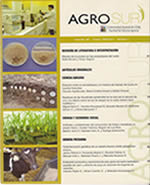Participatory work in response to the needs of rural food producers. Study of cases
Main Article Content
Abstract
Family farming is inextricably linked to food security. The culture and idiosyncrasies of farmers demand a close relationship that respects their practices. The objective of this study was to evaluate the impact of participatory work in the diagnostic and design of innovations in two family production systems of Santiago del Estero province, Argentina. The work was carried out during 2015-2018. To carry out the assessment, it was previously agreed with each producer about the aspect of their food system they wanted to change and the extent of the proposed innovations. In both farms, improvements were made regarding practices and were maintained over time. Results in farm 1: The producer is eliminating old and unproductive goats; a low cost feeder has been built; the presence of mastitis was significantly reduced, the milking routine has improved and specific equipment to improve the quality of the cheeses was incorporated. Results in farm 2: a slaughter room was built; waiting, fasting and desensitisation have been incorporated in the slaughter process; production increased by 375% and has been staggered to avoid productive downturns. The participatory work carried out respecting the culture and practices of the producers allowed the design, implementation, and monitoring of productive innovations.

